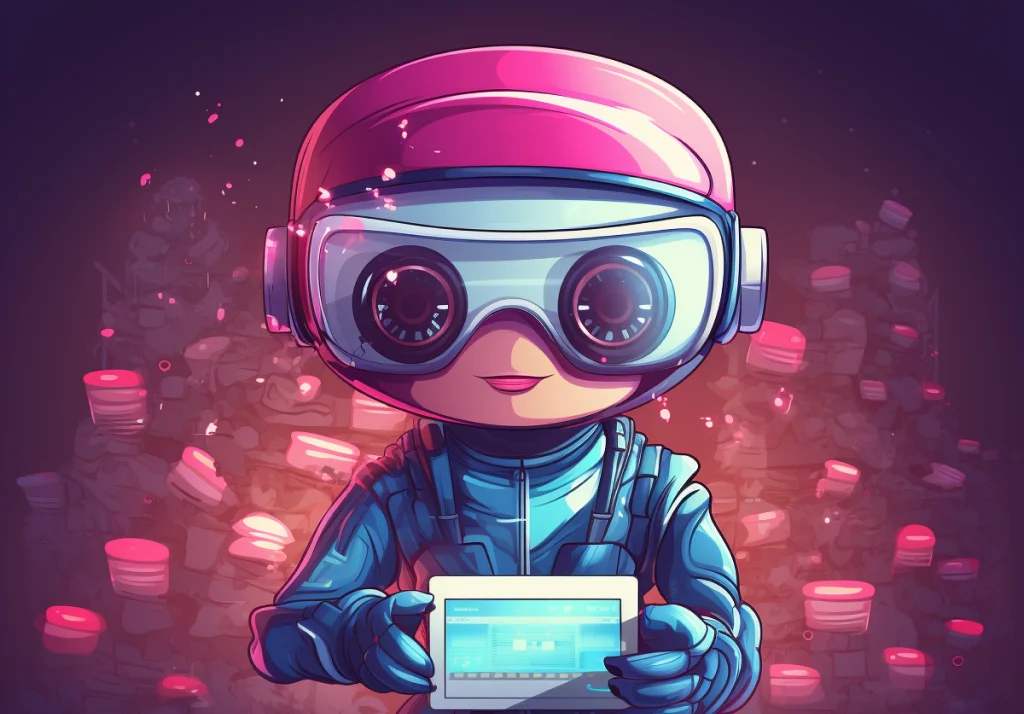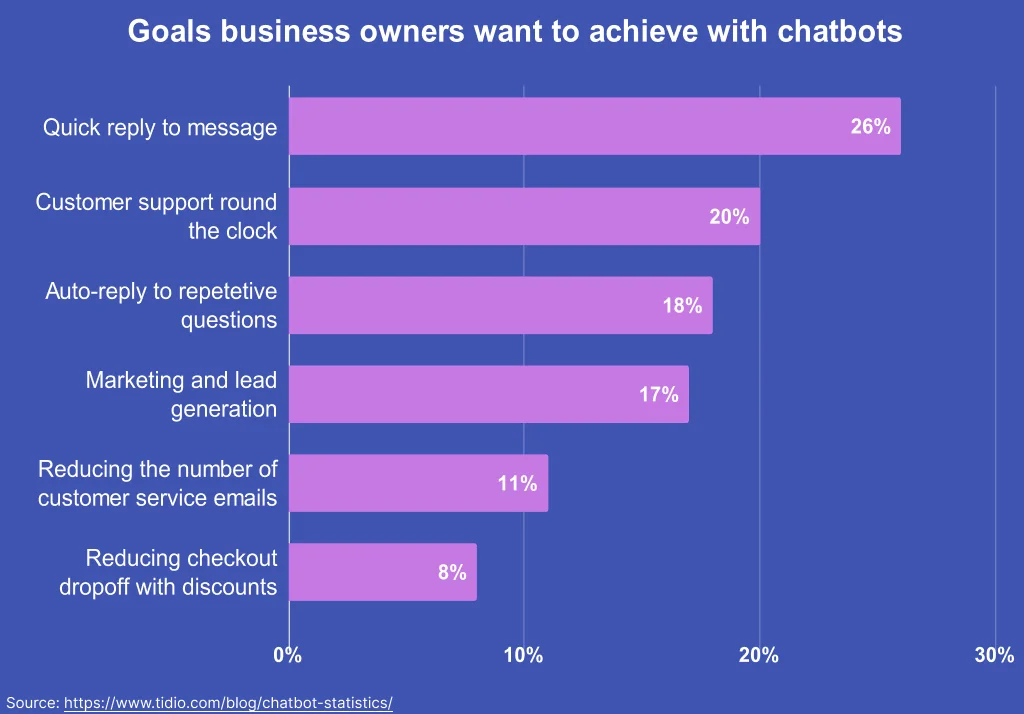Last research shows that over 65% of people have higher expectations for customer service today compared to their standards three to five years ago. For businesses, this means the necessity to embrace innovation in their strategies to stay competitive and build strong relationships with their customers. Chatbots and conversational AI (CAI) have emerged as powerful tools that hold the key to reorganizing customer support.
As a seasoned AI solutions provider, we are here to clear up in this article the differences in the chatbot vs conversational AI topic and help you decide what’s best for your business.
5 differences between chatbot and conversational AI
The future of customer service is shaped by the synergy between chatbots and conversational AI. They allow you to optimize business efficiency, deliver personalized experiences, and benefit from a customer-centric approach.
Chatbot usage is rapidly growing in many industries, including finance, education, healthcare, retail, manufacturing, etc. But to harness the power of this technology, it is needed to dive deeper into the specifics and define what suits you best. So, what is the difference between chatbots and conversational AI? Let’s study 5 primary distinctions.
Technology
The technology behind chatbots and conversational AI shares common foundations but differs in complexity and capabilities. Chatbots rely on a rule-based or scripted approach. When a user inputs a message, the chatbot scans it for specific keywords and matches them to pre-programmed responses. These responses are designed to handle common queries and tasks. Chatbots do not possess a deep understanding of language context and can only provide answers based on the programmed patterns they recognize.
Conversational AI is built on more advanced technologies like NLP and ML. It goes beyond rule-based approaches to understand the context, intent, sentiment, and nuances of human language. Conversational AI systems are able to handle complex interactions, engage in back-and-forth conversations, and even learn from user interactions to improve over time.

Adaptability and training
Chatbots are often static and require manual updates to launch new scenarios or user queries. In contrast, conversational AI is designed to learn and adapt over time. It continuously improves its responses by learning from interactions. It can identify patterns, refine its understanding of user intent, and even introduce new responses without requiring constant manual intervention. This adaptability ensures that conversational AI remains effective in addressing evolving customer needs.
Personalization
Chatbots offer consistent responses to common queries, which is useful for routine tasks and simple inquiries. Conversational AI takes personalization to a higher level. It not only remembers user preferences but also recalls past interactions, ensuring a continuous and context-rich conversation. This leads to more personalized recommendations, targeted solutions, and a deeper engagement that resonates with customers on an individual level.
Moreover, conversational AI is able to detect emotional cues and respond with empathy. It can understand user sentiment and adjust its tone and responses accordingly. This emotional intelligence allows conversational AI to handle more sensitive and emotionally charged conversations with a human-like touch. While chatbots provide efficient, simple responses, they lack the emotional nuance required for handling complex or emotionally involved interactions.

CAI vs chatbot in terms of task automation
Both tools are aimed to automate business tasks. The difference lies in their capabilities. Chatbots are rule-based systems that efficiently handle routine tasks and inquiries by following predefined patterns and providing quick responses.
Conversational AI is like a leap into the future compared to regular task-based automation. It goes way beyond what simple chatbots can do, adding a human touch to interactions. It’s like a blend of data, machine smarts, and understanding language – all coming together to make conversations feel as real as talking to a person.
Complexity of interactions
Chatbots excel at handling linear and single-turn interactions. They are well-suited for providing information, guiding users through basic processes, and automating repetitive tasks.
Conversational AI shines in multi-turn conversations, where users might ask follow-up questions or provide more details. It can maintain the context of the conversation, engage in back-and-forth exchanges, and address complex issues that require a deeper understanding of user intent. For example, they are able to process and fulfill e-commerce orders, solve technical problems, or offer personalized recommendations based on user preferences.
Based on our experience in the field, we are sure both tools are beneficial. Still, conversational AI boasts notable advantages over chatbot potential and wins the conversational AI vs chatbot battle. Let’s look at the summarization table below.
| Conversational AI | Chatbot |
| Relies on NLU, NLP, insight, and contextualization. | Works with a predefined dialog flow script. |
| Highly scalable as the database and company pages are updated, as well as conversational AI, making it very easy and fast to scale. | Maintenance, updates, and patches are performed manually, making it tricky and costly to scale up. |
| Omnichannel and can be deployed across sites. | It can only be used as a chat interface. |
What to choose?
The choice between chatbot vs conversational AI depends on your business scale, objectives, clients’ needs, and the level of engagement you seek to achieve. According to the statistics, most businesses want to get faster replies and round-the-clock support instead of managing staff’s working hours.

Let’s compare primary business purposes with AI tools capabilities to help you make an informed decision what to choose:
- Basic customer support: If your primary goal is to handle routine inquiries and provide quick answers, a chatbot might be suitable. Chatbot can assist customers with tracking orders, answering common queries, and providing basic product information. Example: A customer visits an online store and uses the chatbot to inquire about the return policy. The chatbot quickly gives information on the return process, saving both the consumer and support team time.
- Enhanced engagement: When you aim to offer personalized recommendations and engage customers in dynamic conversations, conversational AI is a better fit. Example: A user interacts with a conversational AI on a travel website, sharing their destination, budget, and travel dates. The AI engages in a conversation, suggesting personalized travel options, accommodations, and activities tailored to the user’s preferences.
- Lead generation: To qualify leads and guide them through the sales funnel, conversational AI is a perfect match. Example: A visitor lands on a software company’s website and interacts with a conversational AI. The AI asks questions about the visitors’ business, pain points, and software requirements. Based on the responses, the AI qualifies the lead and schedules a demo with a sales representative.
Analyze your specific business needs to determine which solution aligns best with your goals.
Implement Artificial Intelligence tools with confidence thanks to MetaDialog’s expertise
Chatbots vs conversational AI is a fascinating competition that modern users witness today. While both of them serve the purpose of automating customer interactions, conversational AI offers a higher level of sophistication, personalization, and adaptability due to its advanced natural language understanding and learning capabilities.
To implement such solutions, you don’t need to interrupt your workflow or spend months waiting for custom software development. Our team of experts is ready to deliver a fully customized solution to cover your support service needs and automate 87% of your customer questions in 1 hour.
We offer you a free opportunity to test our MetaDialog AI engine. By downloading the knowledge base, you can check the AI-powered chatbots’ proficiency firsthand. Establish robust connections with your clients and foster brand loyalty with our full-fledged conversational interface platform.
